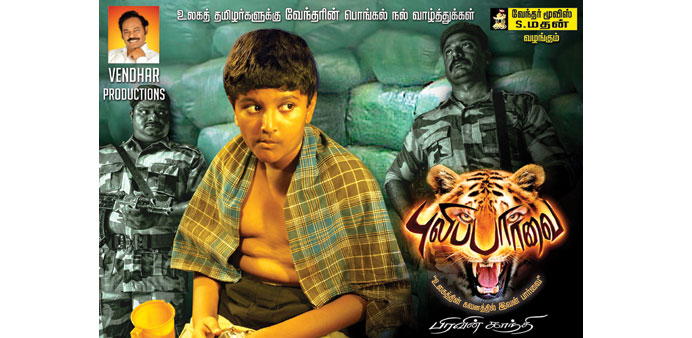By Gautaman Bhaskaran
An image, however fleeting, may inspire a filmmaker to weave a story. Tamil director Pravingandhi saw one in February 2013 on BBC’s Chanel 4, and was enthused to make Puli Paarvai (Tiger Look).
The photograph was that of a boy, barely 12, eating a snack before being shot dead. The child was Vellupillai Prabhakaran’s son, and the man as the leader of the Liberation Tigers of Tamil Eelam (LTTE), had fought a 30-year war in Sri Lanka against the Sinhala-dominated government. He had demanded a separate homeland for the minority Tamils in his country. Prabhakaran was eventually killed, and the civil strife had ended in 2009, but the wounds remain, refusing to go away any time soon.
With Tamils in Tamil Nadu closely bonded with their Sri Lankan brethren, movies even with just about a whiff of anti-Lankan Tamil sentiment have had a rough time in the state. Santosh Sivan’s Inam, Shoojit Sircar’s Madras Café and Prasanna Vithanage’s With You Without You were not allowed to screen in Tamil Nadu theatres. Inam and reputable Sri Lankan director Vithanage’s work were by no stretch of imagination against Prabhakaran or the Tamils.
It is in a scenario such as this that Puli Paarvai is all set to open in Tamil Nadu. It has been passed by the Central Board of Film Certification. And media advertisements have been going to town with a catch line: We love India.
And this is what Pravingandhi emphasised to me during a recent telephone conversation in Chennai. “We love India”, he said repeatedly. “I wanted to tell the story of 12-year-old Balachandran, who was offered a snack and pumped with bullets the next minute, and his look – which was captured on Channel 4 – was bold, fearless. The boy’s (portrayed by a Chennai schoolboy, Satyadev) stare resembled that of a tiger, hence the title, Puli Paarvai or Tiger Look. Or, it can well mean the Tigers as the LTTE was popularly known as.
Pravingandhi comes as a staunch Tamil. “The LTTE was pushed into the war. It was a war fought for a just cause, and my movie will spin a yarn around this. Of course the main theme will be the tragedy of Balachandran. Of course, there will be sub-plots and subtexts, and there will be songs to cater to the masses. Otherwise, Puli Paarvai may well be a documentary,” the helmer averred.
As much as Pravingandhi may be steadfastly a Tamil loyalist, he has, at the same time, paternal feelings for Sri Lanka as a whole. “It is India’s baby, and both nations are linked in so many ways”.
I cannot but be reminded here of what Vithanage often tells me. “I love Chennai. It is so much like my home.” And he is in the city very often – on work and for pleasure. But the moot point is, has the city embraced him?
Venetian controversy
What is a movie festival without a controversy? Invariably, Cannes has one and almost every year. And now Venice seems to have taken the cue. In the prevailing tension and war between Israel and Palestine, it was only to be expected that cinema director Suha Arraf’s Villa Touma, selected for the Critics Week at the 71st edition of the Venice International Film Festival, would face some kind of problem.
Arraf’s movie got $400,000 from the Israel Film Fund, but has now been classified as a Palestinian work by the helmer. So, the Israeli government has asked that the money be returned. And Tel Aviv cannot really be faulted here in this case. Arraf’s decision to call her film a Palestinian work was clearly a breach of contract. For, the fund had said in no uncertain terms that the financial support could be used only to make an Israeli movie.
Although since then Arraf has urged the festival not to brand her film Palestinian – and the Critics’ Week website also stands amended – Israel appears adamant. Limor Livnat, the country’s Minister for Culture and Sport, has demanded that the fund return the amount invested in the movie to the Israeli Film Council.
Arraf’s feature also received $33,000 from the Israeli National Lottery and $174,000 from the Israeli Economy Ministry. Which said in a statement that it was exploring the legal aspects of the situation. Villa Touma is set in the early days of Israeli occupation and narrates the story of three unmarried, aristocratic Christian sisters from Ramallah. They shut themselves in their splendid villa and lead a reclusive life, which turns topsy-turvy with the arrival of their orphan niece.
Villa Touma is Arraf’s debut feature, and she is best known as the scriptwriter for The Syrian Bride and The Lemon Tree. She also wrote Villa Touma. The festival runs from August 27 to September 6.
l Gautaman Bhaskaran has been writing on Indian and world cinema for over three decades, and may be e-mailed at

